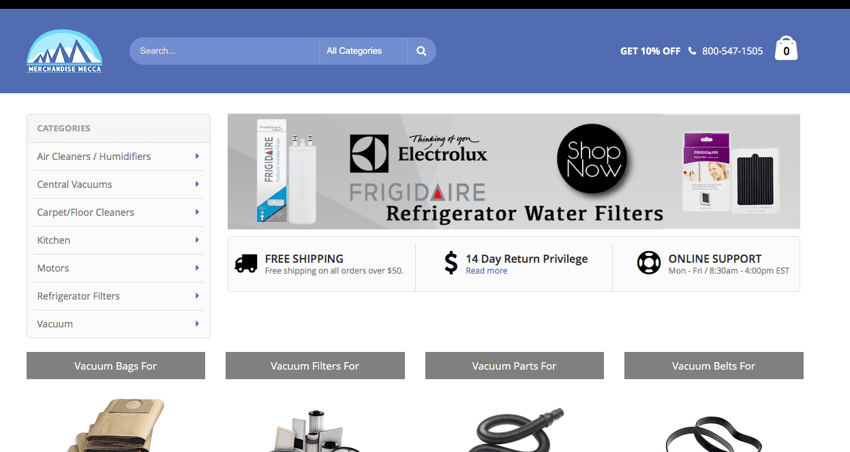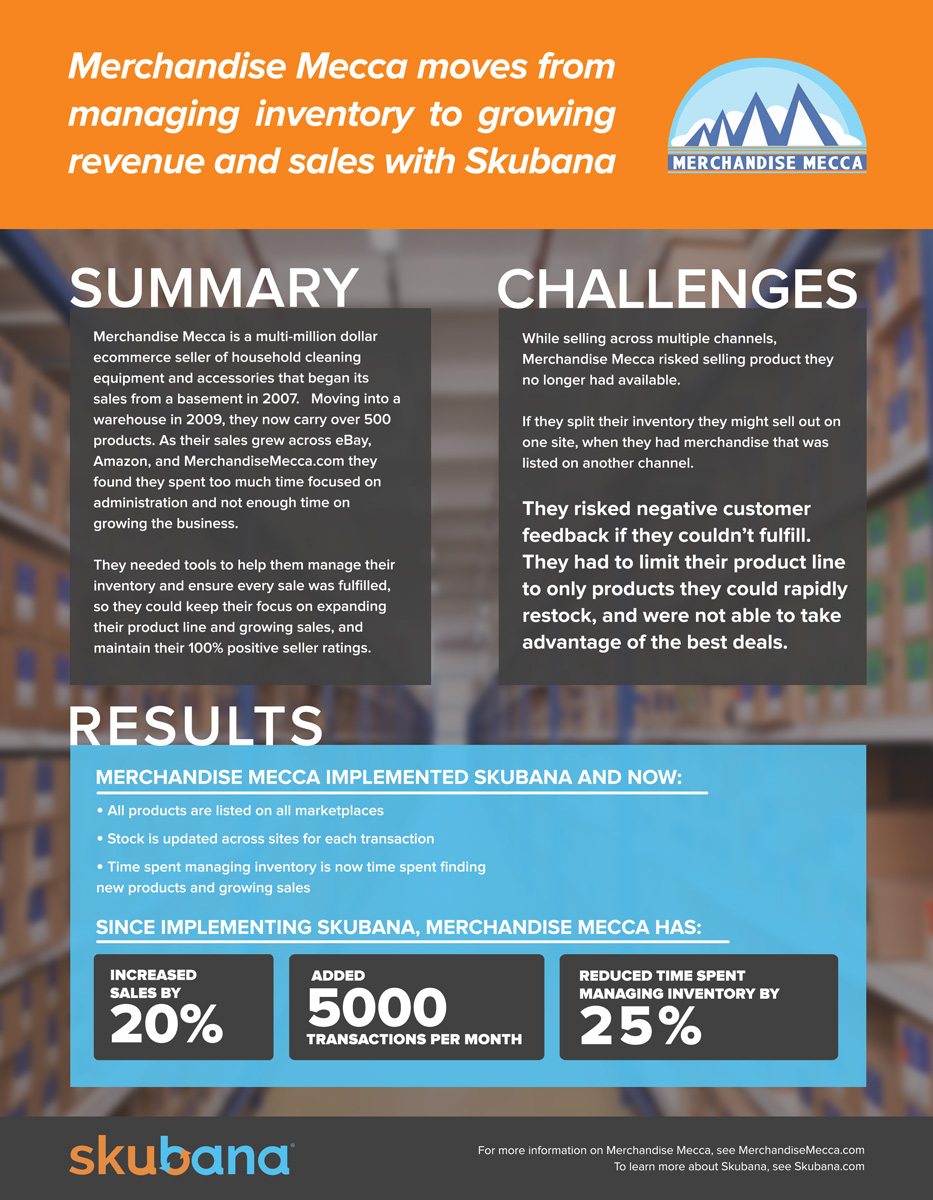Launching an e-commerce business is simple enough. All you need is a supplier, a space to unpack and repack everything, and the ability to list on eBay or another online marketplace. That's where most of us start out.
Unfortunately, there's a big difference between selling online and launching a successful e-commerce business capable of standing on its own as a brand. But, that's where Merchandise Mecca, and hundreds of other brands are today.

Short history of Merchandise Mecca
Like many e-commerce sellers, Merchandise Mecca started out small. David Wolfe began drop shipping products on eBay, selling to add to the income from his full-time job. Eventually, he moved away from drop shipping, using his 17 years of experience in flooring products to begin selling vacuum parts, Kirby chemicals, and vacuum bags, also on eBay.
Wolfe adopted a simple practice of choosing to prioritize quality products over offering the lowest prices, and investing in each product to ensure that consumers could see what it was. He made his company stand out with good business practices, and worked to ensure that every product had a unique description including all manufacturer information, unique photos, quality information, and that he took the time to market it using PPC or social media. These steps ensured that customers could see his products, learn enough about them to make a purchase decision, and move forward with the purchase.
By the time he launched his own website, Wolfe already had positive reviews on Amazon and eBay, and was able to use his stellar online reputation to make sales.
Customer Satisfaction Comes First
Selling on any platform allows you to reach a large audience of consumers, but whether you're selling on Amazon (e.g. Merch by Amazon), eBay, or your own website, customers are often aware that you might not be legit.
Wolfe was aware of this from the first, after selling on eBay in the early days of the site. Even today, Amazon and eBay sellers with a high level of positive feedback can sell almost anything on the reputation of their channel, while newcomers are often passed by. Similarly, a brand with a great deal of positive feedback on their website may seem attractive to a consumer even if they aren't familiar with the site, because they trust peer reviews. This is especially true for sellers listing manufactured products on Amazon and eBay, where you are certain to have competition.
Merchandise Mecca adopted this as a brand policy, working hard to achieve a quality customer rating.
- Focus on quality products
- Use PPC and other forms of advertising to improve sales
- Process orders as quickly and accurately as possible
- Fulfill orders quickly
- Offer good customer service.
This holds true today in that any e-commerce seller needs a quality reputation and good reviews to succeed. Merchandise Mecca follows through on orders across all their channels to ensure quality feedback which in turn, boosts sales.
Inventory Management was a Barrier to Success
While Merchandise Mecca rapidly grew their sales, enabling the company to expand into new channels and launch their own website, inventory management was a huge barrier to growth. After adapting to multichannel sales, the company was faced with the concern of overselling and canceled orders.
Overselling means putting customers on back order, or emailing them and canceling the order, resulting in no delivery and prompt refund or a delayed delivery. In either case, the customer is more likely to leave a negative review, decreasing the store's ability to sell in the future.
Merchandise Mecca had two options:
- Splitting all inventory across all channels. This involves creating separate inventory for each channel, so that each channel only pulls from specific inventory available to it. Unfortunately, this often results in lost revenue, because it limits sales on every channel and one channel may barely sell while another is sold out.
- Only selling products that can be restocked within a few days in case of a stock out event. Merchandise Mecca chose this option because it enabled them to sell more without worrying too much about inventory. However, it dramatically limited products that the store could sell.
When Merchandise Mecca moved to Skubana (now Extensiv), they were still limited to selling products they could restock within a few days. However, Extensiv's real-time inventory management provided a solution to one of their biggest obstacles to growth.
Extensiv enabled Merchandise Mecca to track their actual inventory across all their channels, in real time, so that when a product sold on one channel, inventory automatically updates across all channels. Merchandise Mecca used this to solve their biggest inventory management problem, enabling them to prevent stock outs and overselling without underselling or limiting products. This, in turn, helped them to maintain their 100% positive feedback rating (99% customer satisfaction), by ensuring that orders could be delivered on time, without risking stockouts, and without limiting inventory. As a result, they can now spend inventory management time finding new products and generating new revenue.
Moving Inventory to the Next Level
Merchandise Mecca used Extensiv to cut costs, save time, and prevent stock-outs. This enabled them to add more products, increasing total inventory to over 500 unique product SKUS. Because Extensiv automates processes between shopping cart and fulfillment, Merchandise Mecca also saves time on fulfillment, because they can easily print shipping labels and get self-fulfilled products out the door with a minimum of time investment, reducing total costs and improving efficiency.
Merchandise Mecca also uses other tools to improve overhead, fulfillment time, and customer satisfaction.
For example, the company invested in individually labeling products and shipping them to Amazon FBA. Amazon FBA increases sales volume while boosting review quality, because Amazon can fulfill quickly to boost customer satisfaction.
If you don’t sell on Amazon, a 3PL is a similarly valuable solution, in that it allows you to boost shipping time and cost, to improve customer satisfaction, and reduce the burden of high-volume shipping on your own warehouse.
What Makes the Difference for E-Commerce?
While Merchandise Mecca is successful, they are the exception to the rule. But what makes the difference between a company that enjoys a brief surge of success and then returns to the basement or goes out of business?
Merchandise Mecca founder, David Wolfe attributes his success to the following factors:
Industry Knowledge
Learning the niche, following product life cycles, and knowing when to cut inventory before it becomes worthless is a valuable skill that can and will save thousands. This kind of industry knowledge is often only built up by experience in the niche, but it is important to learn.
Good Technology
Programs like Extensiv allowed Merchandise Mecca to increase sales by 20%, add 5,000+ transactions per month, and reduced inventory management time by 25%. Quality technology is an investment, but like any good investment, will create a return for your business. Successful e-commerce businesses need the tools to merchandise, manage, market, and fulfill orders quickly, so that customers stay happy. Your tools must meet your needs and fill gaps to enable you to be more productive. Merchandise Mecca uses e-commerce management, ERP, and inventory management tool Skubana, repricing tool Feedvisor, a review tool, Feedback Five, and many others to successfully manage their business.
Good People
Finding quality employees who love what they do, or are dedicated to what you do, will make a difference. If you can trust that employees are doing their jobs right, aren't stealing or damaging product, and are treating your customers right, you have a distinct advantage over even big-name brands.
Hard Work
No e-commerce business is successful overnight. Every million-dollar store that you see today started out in a basement or under similar circumstances and worked their way up.
Quality Products
A good reputation is worth more than the slight increase in overhead to get better products. David Wolfe states that he reviews all his products for quality to ensure that customers will love them, to increase customer satisfaction, reduce returns, and boost his overall online reputation.
Supplier Relationships
Building and maintaining quality supplier relationships is important to e-commerce, no matter what you are selling. Suppliers can help you to choose the right products, can tell you when not to buy, and can help you to succeed. Maintaining good relationships means staying in touch, paying on time, and keeping up with what's happening in your niche.
Data and Analytics
Strong data and analytics are crucial to selling multichannel because you must know where your profit is coming from, which channels sell which products, what FBA and 3PL are selling, and how to maximize everything. Data can also tell you when products aren't earning you anything or even when they are costing you money, so you can cut them, absorb the loss, and move on to products that earn you money.

Running a successful e-commerce business means investing time and money into quality products, processes, and technology. If you can sell a quality product, offer enough information and photos to show the customer what they are buying, and deliver it to them in a timely manner, while offering great customer support, you can build the kind of online reputation that will allow you to grow and succeed.
-
You’ll read about:
Be the first to know
Subscribe to our newsletter





